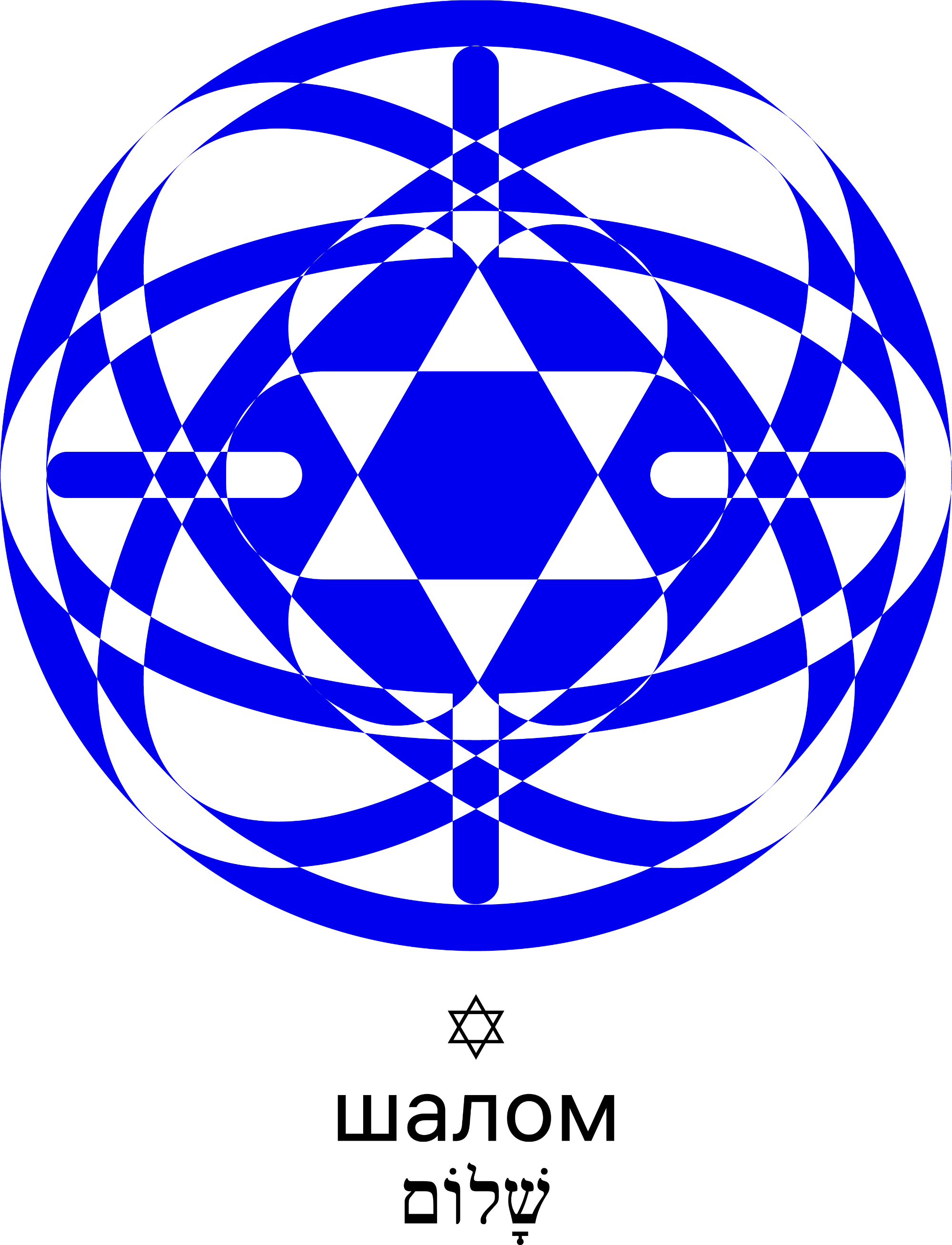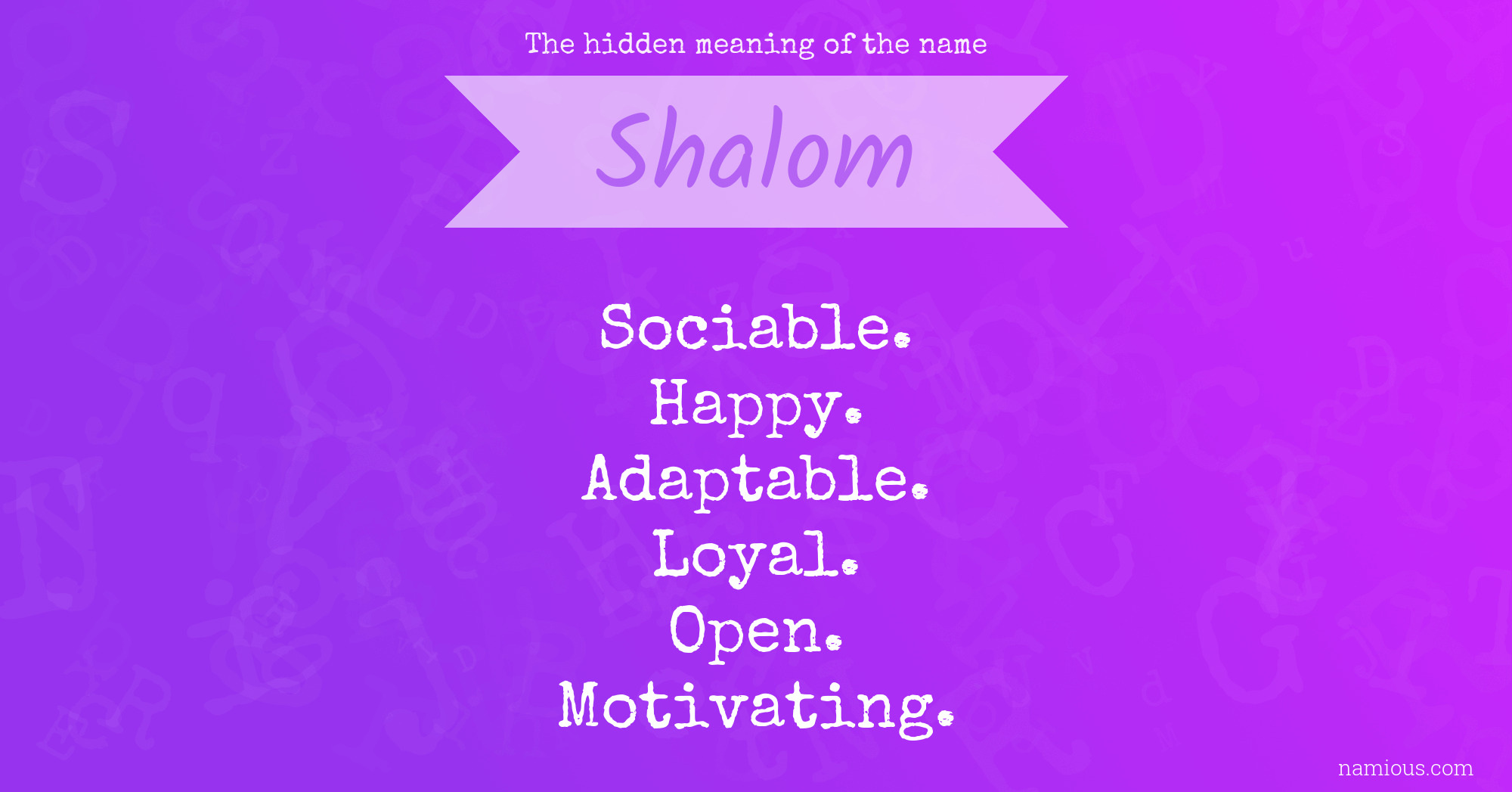What Nationality Is The Name Shalom? Unpacking A Name's Deep Roots
Have you ever wondered about the true background of a name, especially one that sounds so universally comforting? It's a common thought, too it's almost, as people often connect names directly to a specific country or place. When we hear a name like "Shalom," a lot of questions pop up, particularly about its origins and what it might tell us about a person's heritage. This name, in a way, carries a beautiful message, and its story is really quite interesting.
Figuring out a name's "nationality" can be a little tricky, you know? That's because a name's origin, where it first came from, isn't always the same as a person's nationality. Nationality, as we see it today, is tied to legal belonging to a nation or state. It's about the country you are a citizen of, the place that gives you certain rights and also expects responsibilities from you. So, a name's story is often more about its cultural journey than a passport.
So, what about the name Shalom? Is that a name from a particular nation? To answer that, we need to look beyond just modern borders and think about where the sounds and meanings of words first began. It's a journey into language and history, and it helps us see how names travel across time and different communities. You'll find, perhaps, that its roots are older and broader than you might first guess.
Table of Contents
- Understanding Nationality and Name Origins
- The Hebrew Heart of Shalom
- Shalom and Jewish Heritage
- Common Questions About the Name Shalom
- The Evolving Story of Names
Understanding Nationality and Name Origins
When someone asks, "What nationality is the name Shalom?", it's a really good question, but it also brings up a bigger point about what nationality actually is. Many of us, you know, tend to mix up nationality with other ideas, like where a name first appeared or a person's cultural background. It's helpful, therefore, to get a clear picture of these concepts, especially today, as people move around the world so much.
What Nationality Really Means
Nationality, in simple terms, is about belonging to a particular nation. It's a legal connection, actually, between a person and a state. This means you are a citizen of that country, either because you were born there or because you went through a process to become a citizen. It gives you rights and responsibilities, like voting or following the laws of that country. The terms "citizenship" and "nationality" are often used to mean the same thing, where citizenship points to the full legal status that gives you civil rights in a country, while nationality is more about that link of belonging and adherence to a legal order. A person from North America, for instance, could have Canadian nationality or U.S. nationality. It's about legal and political belonging, not about your family's ancient roots or cultural practices.
It's important to remember that nationality is separate from ethnicity. Ethnicity, in contrast, is all about your culture and heritage. This includes things like your language, traditions, and the history of your people. You choose to celebrate your ethnicity, but you are legally assigned your nationality. People from a particular place can have several demonyms, too, ranging from a general demonym to more specific ones, but these are still tied to geographical or political areas. So, while a name might be very common within a certain ethnic group, that doesn't automatically make it tied to a single nationality.
How Names Get Their Roots
Names, like words, have their own life stories. They come from somewhere, often from ancient languages or very old traditions. The origin of a name tells us where it first came into use, what it meant to the people who first used it, and how it spread. This is very different from nationality. A name can originate in one region or culture, but then people carry it with them as they move, and it can become popular in many different countries. So, a name might have a clear origin, but people of many nationalities can carry it. This is a bit like how certain words from one language become common in others, too, like "kindergarten" or "tsunami."
For example, a name might come from an ancient language that is no longer spoken widely today, but it lives on through the names people use. Or, a name might be linked to a religious text or a significant historical event. These origins give names their deep meaning and cultural weight. They tell us about the history of human groups and their beliefs, rather than just where someone holds a passport today. Knowing this helps us see why "What nationality is the name Shalom?" is a question that needs a thoughtful, expanded answer, you know, one that looks at more than just modern-day country lines.
The Hebrew Heart of Shalom
When we look at the name Shalom, its origin is very clear. The name Shalom has Hebrew origins, and it's really quite deeply rooted in Jewish tradition. This is a key piece of information when thinking about its "nationality." It means that the word itself, and then the name, came from the Hebrew language and was first used by Hebrew-speaking people. This is different from saying it's "Israeli nationality" because the Hebrew language and Jewish people existed long before the modern state of Israel was formed, you see. The name has been around for thousands of years, carrying its beautiful meaning through generations.
The Meaning Behind the Word
The word "Shalom" itself is incredibly rich in meaning. In Hebrew, shalom means peace, harmony, or wholeness. It is often used as a greeting or farewell, conveying wishes for wellbeing and completeness. The surname Shalom is of Hebrew origin and has multiple meanings, all connected to this central idea of peace and wholeness. It means more than just the absence of conflict; it means a sense of completeness, safety, soundness (in a body), welfare, health, prosperity, quiet, tranquility, contentment, and friendship. It's a very full and positive concept, which is why it's such a beloved word and name. It's interesting to note that although the Hebrew shalom and Arabic salaam have a similar origin, meaning, and sound, the Hebrew emphasizes the meaning of wholeness and completeness, which is a bit unique.
So, when you encounter the name Shalom, whether it's a first name or a last name, you are carrying a piece of this deep, ancient meaning. It's not just a collection of sounds; it's a wish, a state of being, and a profound concept. This name derives from the Hebrew "shâlôm," meaning peace, completeness (in number), safety, soundness (in a body), welfare, health, prosperity, quiet, tranquility, contentment, and friendship. It’s a powerful word, really, that has resonated through countless years, and it's pretty special that it became a name people carry. You can learn more about name origins and meanings on our site, which helps explain how words become names.
Shalom as a Name: First and Last
Shalom is used both as a first name and a surname. As a first name, it's a Hebrew unisex name, which has six letters. It's quite common to find it given to both boys and girls in various communities around the world. As a surname, the last name Shalom has also seen a notable increase in popularity in places like the United States, according to the decennial U.S. Census, which is interesting. This shows how names can spread and become more widely used beyond their initial cultural context, which is, you know, a common thing with names that have strong meanings. You can find out the popularity of the first name Shalom, what it means, and the history of how Shalom came to be, along with statistics, charts, and maps from various sources, which is pretty cool.
The fact that it's a surname also points to its long history. Surnames often come from a person's occupation, a place, or a characteristic. In this case, it likely came from the meaning of the word itself, or perhaps from someone known for embodying peace or wholeness. There are many records for the Shalom last name, too, exploring historical collections such as birth records, death certificates, and immigration data. This information helps us trace the movements of families with this name over time, showing how people carrying the name Shalom have settled in various countries, taking their name with them, which is quite fascinating.
Shalom and Jewish Heritage
The name Shalom is really quite deeply connected to Jewish culture and heritage. Because of its Hebrew origin and its profound meaning within Jewish texts and daily life, it's often associated with Jewish people. This connection, however, is about ethnicity and cultural identity, not strictly nationality in the modern sense. Jewish people live in many different countries and hold many different nationalities, yet they share this common cultural and linguistic heritage, and the name Shalom is a part of that shared experience. It's a bit like how someone might have an Irish surname but be an American citizen; the name points to heritage, not current citizenship.
Cultural Significance of Shalom
The word "Shalom" is not just a name; it's a cornerstone of Jewish culture and communication. It's used as a greeting ("Shalom Aleichem" – peace be upon you) and a farewell. It represents a fundamental value of peace and wholeness within the community and in a person's life. This makes the name more than just a label; it's a statement of aspiration or a reflection of a deeply held belief. When someone is named Shalom, it often carries this cultural weight and hope for a peaceful life. It's a very meaningful choice for many families, you know, one that connects them to a long and rich tradition. This is why it's so popular within Jewish communities, regardless of where those communities are located around the globe.
The name's popularity, meaning, and origin are often explored together because they are so intertwined. It's part of a cultural tradition. Ancestry can tell you your first name’s origins plus its meaning, showing how names are passed down and how they represent a part of family history. The name Shalom, being so central to Jewish life, is a perfect example of a name that embodies a deep cultural significance, rather than just a simple geographic tag. It's a name that resonates with history and shared identity, which is, arguably, more important than just a country on a map.
Global Presence of the Name
While the name Shalom has Hebrew origins and a strong connection to Jewish heritage, people of various backgrounds and nationalities can carry it today. As people move and cultures mix, names travel. You will find individuals named Shalom who are citizens of many different countries, like the United States, Canada, France, Brazil, and, of course, Israel. Their nationality is defined by the legal boundaries of the state they belong to, not by the ancient origin of their name. This is a pretty common pattern with names that have strong historical or religious ties, as they often transcend geographical borders. You can check out the rights and restrictions for individuals regarding immigration, which shows how nationality changes but names often remain.
The popularity of the name Shalom in 39 countries, along with its origin and meaning, is something that gets tracked. This data shows how widely distributed the name is. According to the decennial U.S. Census, the popularity of the surname "Shalom" has seen a notable increase between 2000 and recent years, which is quite interesting. This suggests that the name is becoming more recognized and used in diverse populations. So, while its roots are firmly in Hebrew, its presence is global, reflecting the diverse world we live in today. It's a really good example of how names can be both specific in their origin and universal in their reach.
Common Questions About the Name Shalom
People often have similar questions when they think about names like Shalom, especially since its cultural ties are so strong. Here are some common thoughts and their answers, which, you know, help clarify things a bit.
Is Shalom only a Jewish name?
While the name Shalom has deep Hebrew origins and is very significant in Jewish culture, it's not exclusively used by Jewish people today. People of various backgrounds and nationalities can carry the name. Its meaning of "peace" makes it appealing across different communities, too. So, while its roots are firmly in Jewish heritage, its usage has expanded.
What is the difference between the origin of a name and a person's nationality?
The origin of a name refers to the language or culture where the name first appeared and what it meant there. Nationality, on the other hand, is a legal status that connects a person to a specific country, giving them rights and responsibilities. A name's origin is about its historical journey, while nationality is about a person's legal belonging in the present day. For example, a name might be of German origin, but the person carrying it could have Japanese nationality. We explain all three concepts: race, ethnicity, and nationality, with helpful examples, which is good to know.
Can someone named Shalom be from any country?
Absolutely. A person named Shalom can hold the nationality of any country in the world. Their nationality depends on where they were born, where their parents are citizens, or where they have become a naturalized citizen. The name's Hebrew origin points to its cultural and linguistic background, but it doesn't limit a person's legal nationality. Nationality is considered a fundamental human right, and people can gain it through birth or naturalization, regardless of their name's ancient roots. You can learn more about nationality defined and explained with examples on another page.
The Evolving Story of Names
The journey of a name like Shalom is a wonderful example of how language and culture intertwine and travel across the globe. It reminds us that while names have specific origins, their use and the people who carry them are part of a much wider, ever-changing human story. The name Shalom, with its powerful meaning of peace and wholeness, continues to resonate with people, regardless of their legal nationality. It's a testament to the enduring power of words and the connections they create between people. So, next time you hear the name Shalom, you'll know it carries a legacy far beyond any single border, which is really quite something.

Shalom kindergarten logo

The hidden meaning of the name Shalom | Namious

Shalom (@Shalom30886106) / Twitter